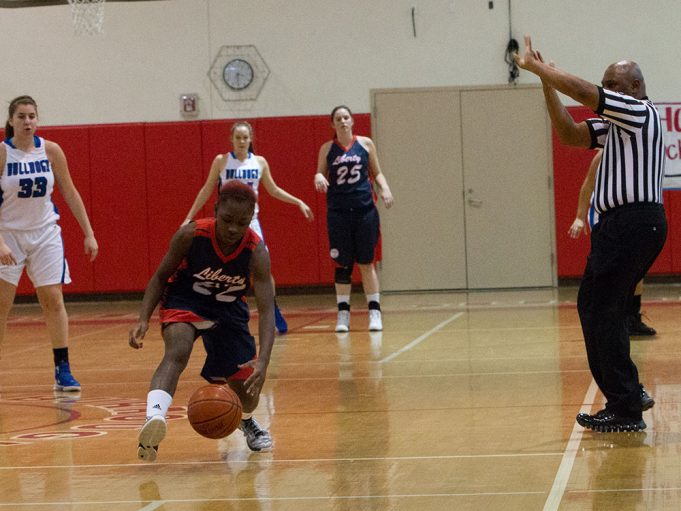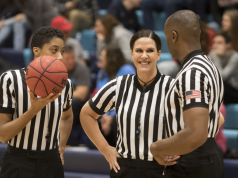There may never be a game we officiate that is free from controversy, in which every call is met with agreement from two compassionate coaches. Many calls officials make are challenged and open for interpretation.
Coaches, players and especially fans normally view the game through very biased eyes. Often they simply don’t understand how their player could have committed a handcheck or are absolutely certain the opposing guard was traveling. And as we well know, when the call is close, one coach, or both, may request an explanation.
The spotlight is now shining directly on the official. The entire presentation to the coach is under close scrutiny. How we comport ourselves in our body language, facial expressions, tone, inflection and the words we choose will play a large role in reaching a mutual consent or an agreeable conclusion. (Make sure your words are spot on with Referee’s Basketball Definitions book)
Let’s say your block call on the big forward driving the endline was met with strong disapproval from the coach. As you approach the table to report the foul, he or she requests an explanation. After reporting the foul, you begin to gather your thoughts. Your approach to the bench is in a calm and professional manner. Your arms are at your side. You have good eye contact and speak in a pleasant manner without standing face-to-face with the coach. In a relaxed voice, your explanation of what you saw is brief, concise and only about the play and the call.
Coaches who have seen you in the past probably expect that conduct from you. If the coach does not know you, his or her impression is now positive and favorable. That is a way to build a foundation of mutual respect with words and temperament. By taking time to speak to the coach and display rules knowledge and confidence in a non-adversarial manner, your actions will likely prompt the coach to nod his or her head and resume coaching. Coaches should be able to ask a question. And officials should provide an answer if the opportunity presents itself.
When the ball is live, only a few words while running past the coach are usually sufficient. If you are the trail official during a multiple free-throw situation, continue to observe the court while taking a few seconds to speak with the coach. Whether in passing or stationary, those actions will breed a mutual respect that displays maturity, professionalism and diplomacy.
Imagine if you took a different approach in your meeting with the coach. Remember, he or she was only asking for an explanation of your call. You walk toward the coach in a defiant and defensive manner. One hand rests on your hip and the other is in the air moving in conjunction with your huffed voice. “Coach, I know a foul when I see one. Let me call the game and you coach your team. I’m not going to explain every call I make.”
That antagonistic approach will only serve to drive a wedge between coach and official. First, the coach has not received the explanation he or she requested. Secondly, the mood has shifted from two individuals working cohesively to an adversarial relationship. And the coach is confused. He or she doesn’t understand why you chose to be hostile. It was unnecessary and completely avoidable.
Over the course of a game there are often opportunities to discuss a play. But an antagonistic approach clearly demonstrates an inability by the official to communicate effectively. That is not the impression we seek from the coaching ranks. Perhaps the coach begins to think you were unsure of the call and that is your way of avoiding an explanation. Now your abilities as a referee come into question.
A perceived weakness in one area of your game can raise concerns about another. While officials don’t owe coaches an explanation on the majority of calls made during the game, there is a moral obligation to help them understand what we saw that prompted the call we made.
Your ability to communicate properly with coaches is in direct proportion to your rules knowledge and skills as a referee. If your administration of a violation or a foul is correct and according to the rules, then a natural confidence comes with that to explain the play to the coach. In contrast, if you are discussing the reason you called goaltending or a backcourt violation and are not crystal clear on why you made that call, your explanation and body language will come across as uneasy. No matter how smoothly you speak, or how skilled you are at communicating the spoken word, your outer presence will be communicating an unspoken language.
Strive to sharpen your communication skills. During the game, most calls can be made in the same composed tone whether calling a timeout, a violation or a technical foul. Practice how you enunciate your words and responses. Be sure to consider the person on the other end. Don’t get caught up in the, “I’m in charge of this game” mentality. There is no place for unsavory retorts or sarcasm in your words. That is more a reflection on the speaker than the recipient.
Officials are evaluated by so many aspects of the game. They all form the perceptions that shape each official, like communication, appearance, rules knowledge, hustle, mechanics and game management. Speak clearly and choose your words carefully with a coach.
What's Your Call? Leave a Comment:
Note: This article is archival in nature. Rules, interpretations, mechanics, philosophies and other information may or may not be correct for the current year.
This article is the copyright of ©Referee Enterprises, Inc., and may not be republished in whole or in part online, in print or in any capacity without expressed written permission from Referee. The article is made available for educational use by individuals.


















